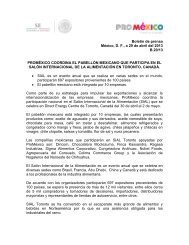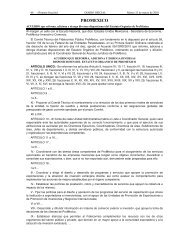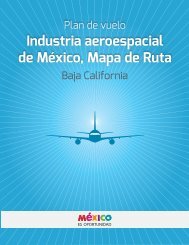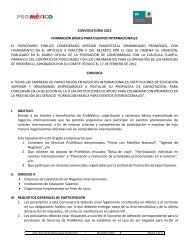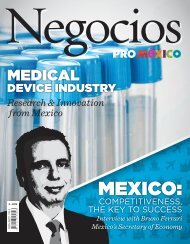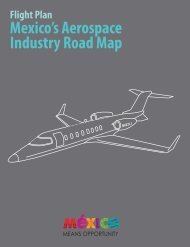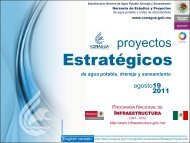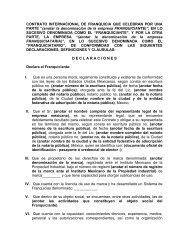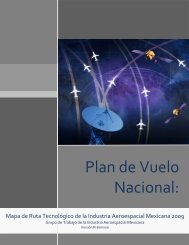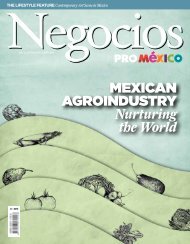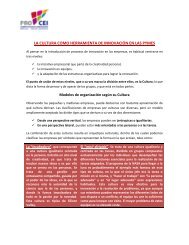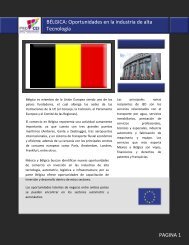ASiAn invASion wElcomEd - ProMéxico
ASiAn invASion wElcomEd - ProMéxico
ASiAn invASion wElcomEd - ProMéxico
You also want an ePaper? Increase the reach of your titles
YUMPU automatically turns print PDFs into web optimized ePapers that Google loves.
62 Negocios i The Lifestyle photo courtesy of Instituto carso de la salud<br />
Commited<br />
to Health<br />
Instituto Carso de la Salud<br />
an initiative of the Carlos Slim<br />
Foundation, is investing resources<br />
and talent to help improve the<br />
lives of the population in Latin<br />
America and the Caribbean.<br />
By Alejandra Atilano<br />
To increase the number of people living longer<br />
and better is the main goal of the Instituto<br />
Carso de la Salud (ICS, the Carso Health Institute),<br />
a community group begun in 2007 by<br />
the Carlos Slim Foundation. It was created to<br />
improve the health conditions of thousands<br />
of people in Latin America through programs<br />
that aim, among other goals, to reduce breast<br />
cancer deaths; promote the early detection<br />
of health risks in pregnant women and their<br />
newborns; and timely treat chronic degenerative<br />
illnesses like diabetes. “What we do<br />
is look for solutions to problems in a direct<br />
way...We could say we are an organization<br />
with human feelings in search of innovative<br />
solutions so that more people can live longer<br />
and better,” said Roberto Tapia-Conyer, the<br />
institute’s general director.<br />
To achieve this, ICS has designed and<br />
implemented diverse strategies. It encourages<br />
the creation of human resources and<br />
financial rewards for individuals and institutions<br />
that have distinguished themselves<br />
for their efforts to improve the health of<br />
people, not only in Mexico but also in all of<br />
Latin America and the Caribbean. It has 10<br />
programs, each one designed to impact a<br />
distinct health area. Its annual budget is 25<br />
million usd, which mostly comes from the<br />
Carlos Slim Foundation.<br />
Stimulus for the<br />
development of talent<br />
As part of its strategy to encourage and recognize<br />
actions that increase the well being of<br />
the populations of Mexico, Latin America and<br />
the Caribbean, ICS has since 2008 awarded<br />
the Carlos Slim Health Prize to individuals<br />
and institutions whose work helps improve<br />
the health conditions of people in the region.<br />
One of this prize’s objectives is to stimulate<br />
the creation of leaders whose investigations,<br />
innovations and developments in the<br />
areas of health, nutrition and the environment<br />
promote the well being of the population.<br />
Each prize includes 100,000 usd.<br />
In its first edition, prizes were awarded in<br />
three categories: innovations in health systems;<br />
individual research; and exceptional<br />
institution. In total, 84 nominations from 12<br />
countries in Latin America and the Caribbean<br />
were received and the winners were<br />
Guillermo Soberón Acevedo, from Mexico;<br />
Cesar Gomes Victoria, from Brazil; and the<br />
community group Socios en Salud (Partners<br />
in Health), from Peru.<br />
In 2009, the honors were awarded to<br />
Guillermo Ruiz-Palacios y Santos, from Mexico,<br />
for his remarkable research, and to CIS-<br />
ALVA of Colombia as best institution.<br />
ICS also has a scholarship program<br />
which offers economic and technological assistance<br />
to young students and researchers.<br />
Between 2007 and 2008, 1,318 scholarships<br />
were awarded and projections for 2009 look<br />
to increase that total to 1,659.<br />
In addition, during the 17th International<br />
AIDS Conference, held in Mexico City in August<br />
Help for many<br />
ICS has an annual operating<br />
budget of 25 million usd.<br />
It has donated medical equipment<br />
to hospitals and clinics, benefiting<br />
36,250 pregnant women and<br />
their newborns.<br />
It has awarded 1,318 scholarships<br />
to students and researchers.<br />
It has awarded 500,000 usd in<br />
prizes to support health research<br />
and innovation.<br />
In 2008, it financed a total of 15<br />
research projects in coordination<br />
with other community groups. The<br />
results of these projects have<br />
benefited 122,000 people.<br />
2008, the Carso Health Institute gave awards to<br />
100 community groups that specialize in AIDS<br />
so they could participate in the event.<br />
Working together<br />
ICS is part of the Mesoamerican System of<br />
Public Health, an initiative of the governments<br />
of Mexico, Central America and Colombia<br />
that is working in coordination with<br />
the Carlos Slim Foundation.<br />
“We are participating inside this system<br />
in the creation of the Mesoamerican Institute<br />
of Public Health, a virtual education<br />
platform,” said Tapia-Conyer.<br />
The objective of this project is to strengthen<br />
the health systems of Central American countries<br />
in areas like malaria, dengue fever, immunizations,<br />
prenatal care and nutrition, among<br />
others.<br />
The association also helps students from<br />
Mesoamerican countries with scholarships<br />
to study for a master’s degree or a doctorate<br />
at the National Institute of Public Health in<br />
Mexico. The Carso Institute and the Carlos<br />
Slim Foundation help pay for tuition, air<br />
travel and a monthly stipend of between 650<br />
and 700 usd.<br />
Another of the association’s initiatives is<br />
the Health Observatory, which is made up<br />
of a network of Latin American researchers<br />
who are working to reach a consensus<br />
on what are the most important and common<br />
health issues. The observatory develops<br />
knowledge, guidelines and help for the<br />
health systems of participating countries.<br />
On research matters, ICS looks to align itself<br />
with other community groups to develop diligent<br />
investigative projects. For example, a current<br />
project with autistic children is developing<br />
diagnostic methods to detect the disease.<br />
What the project does is educate teachers,<br />
parents and personnel from schools and<br />
day care centers on how to identify signs of<br />
autism among children so they can receive<br />
attention and treatment on time.<br />
Other investigations under way look to<br />
help the detection of chronic kidney failure,<br />
deafness, blindness and degenerative chronic<br />
illnesses. Projects to improve nutrition in<br />
adults and children are also being developed.<br />
In the two years since its creation, ICS has<br />
helped thousands of people. Its work is now<br />
an important piece in the search for solutions<br />
to health problems that currently exist<br />
in Latin America and the world. n



